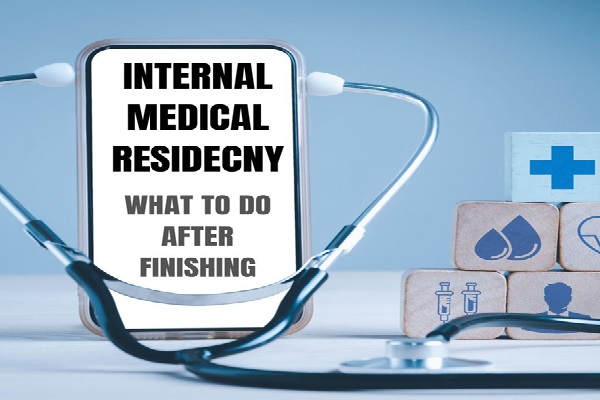
Congratulations, resident internal medicine, on successfully completing your medical journey from medical schools to clinical training, culminating in your internal medicine residency program. This remarkable accomplishment marks a significant turning point in your career in medicine. As you transition from a structured learning environment to the realm of independent clinical practice, a multitude of exciting opportunities and challenges await you. This article serves as your comprehensive guide on what to do after you finish your internal medicine residency, helping you pave the way for a successful and fulfilling career in clinical practice, medical care, academic careers, and beyond.
Reflection and Celebration
Take a moment to reflect on the remarkable strides you’ve made, from your early days in medical schools through rigorous clinical training and the intensive internal medicine residency program. The countless hours spent at the bedside, the late-night calls, and the camaraderie with fellow medical residents and senior residents have shaped you into a skilled and compassionate medical professional. As you bid farewell to your residency program, remember to celebrate your achievements and the knowledge gained, as they lay the foundation for your rewarding career in medicine.
Assessing Career Goals
Now, as you stand at the crossroads of your career in medicine, contemplate your career trajectory as a specialist in internal medicine. Consider your long-term aspirations—are you drawn towards subspecialty training, eager to contribute to public health, or passionate about research in clinical pathology? Or perhaps you’re inclined towards academic careers that involve teaching and contributing to the field of basic science. Evaluating your goals will aid in crafting a roadmap for your professional journey and determining the right balance between clinical duties, additional training, and academic pursuits.
Job Search and Employment Options
With your internal medicine residency complete, the next step is to embark on a job search that aligns with your aspirations and subspecialty training. Hospitals, clinics, academic institutions, public health organizations, and research institutions all offer diverse pathways for resident internal medicine graduates. Network with peers who have chosen different career paths, attend medical conferences, and explore online platforms to unearth promising opportunities. When negotiating contracts, remember that your skills and expertise as a resident internal medicine specialist hold substantial value in both critical care medicine and ambulatory care settings.
Licensure and Board Certification
Securing a medical license in your desired state or country is paramount for your practice as a resident internal medicine specialist. The process varies, so be prepared to navigate paperwork and examinations. Additionally, obtaining board certification not only validates your proficiency but also opens doors to enhanced professional credibility and opportunities across various patient populations.
Continuing Medical Education (CME)

As a resident internal medicine graduate, the journey of learning continues through Continuing Medical Education (CME). Conferences, workshops, online courses, and medical journals offer valuable insights into the latest advancements and best practices, whether in primary care or subspecialty fields like critical care medicine. Active engagement with CME ensures you remain at the forefront of medical knowledge and maintain excellence in your clinical duties.
For those seeking an exceptional online program tailored to medical professionals in training, explore the offerings of Internal Medicine Residency. This comprehensive program, highly regarded across the nation, focuses on assisting medical professionals during their training journey. It’s recognized for its excellence and is well-established in the field. One of the standout features of the course is its instruction by physicians who are board-certified in Internal Medicine, adding a distinctive and credible aspect to the program’s quality. This resource can be invaluable as you continue to expand your medical knowledge and stay up-to-date with the latest advancements.
Building a Professional Network
Networking is a cornerstone of professional growth for any resident internal medicine specialist. Engage in medical societies related to your subspecialty training, attend conferences, and utilize social media platforms to connect with colleagues, mentors, and potential employers across ambulatory care and clinical practice settings. A robust network can provide guidance, collaboration opportunities, and insights into various career paths within internal medicine.
Balancing Work and Personal Life
The demanding nature of the medical profession requires a conscious effort to maintain a healthy work-life balance. As a resident internal medicine specialist, prioritize self-care, allocate time for family and hobbies, and recognize the signs of burnout. A harmonious balance enhances your well-being and, in turn, positively impacts patient care across diverse patient populations.
Financial Planning
As you transition from residency to independent clinical practice, financial planning takes center stage. Strategize loan repayment, explore investment opportunities, and consider retirement planning early on. Seeking advice from financial advisors with experience working with resident internal medicine specialists can provide valuable insights tailored to your unique circumstances and subspecialty training.
Patient Care and Professional Development

Now an independent practitioner, the responsibility of patient care lies squarely on your shoulders as a resident internal medicine specialist. Embrace each case as an opportunity to refine your clinical skills and adapt to new challenges. Stay connected with the medical community to remain abreast of cutting-edge treatments and diagnostic techniques, whether in primary care or subspecialty areas like critical care medicine.
As you start your journey, you might find useful tips and guidance in ‘Your First Year as a Resident Internal Medicine Specialist’. This resource offers a comprehensive overview of what to expect during your first year of internal medicine residency. It covers essential advice, challenges, and strategies to excel in patient care and professional development throughout this critical phase of your medical career. Remember, every step you take in your journey contributes to your growth as a skilled and compassionate healthcare provider.
Mentoring and Being Mentored
The journey of a resident internal medicine specialist is made smoother with mentors by your side. Seek guidance from experienced physicians who can offer insights from their own journeys in clinical practice and subspecialty training. Simultaneously, consider becoming a mentor to aspiring residents, paying forward the knowledge you’ve gained from medical schools to internal medicine residency.
Navigating Malpractice and Legal Considerations
Understanding malpractice insurance and legal considerations is essential for your practice as a resident internal medicine specialist. Stay informed about the intricacies of medical liability and risk management, both in primary care and specialized fields like critical care medicine. This awareness safeguards both your patients’ well-being and your professional reputation across various clinical duties.
Giving Back to the Medical Community
As you progress in your career, remember the importance of giving back to medical schools and the broader medical community. Volunteer your skills, engage in medical education, and advocate for healthcare improvements, whether in ambulatory care settings or specialized fields like critical care medicine. Active involvement within the medical community not only enriches your own experience but also contributes to the betterment of healthcare systems.
Long-Term Career Planning
While focusing on immediate steps, keep your long-term career goals in sight. Whether you envision leadership roles, academic positions, or groundbreaking research endeavors in clinical practice or subspecialty training, plan strategically to turn your aspirations into reality within the realm of internal medicine.
In conclusion, the transition from resident internal medicine to an independent medical practitioner is a journey of growth, learning, and professional fulfillment. This pivotal moment marks the culmination of years of hard work, dedication, and resilience—from medical schools to clinical training and internal medicine residency. Embrace the challenges and opportunities that lie ahead, and remember that your journey as a resident internal medicine specialist is a testament to your commitment to healthcare excellence across various patient populations and career paths. Your expertise and passion have the potential to reshape the landscape of medicine, whether in primary care, critical care medicine, ambulatory care, or academic careers.






